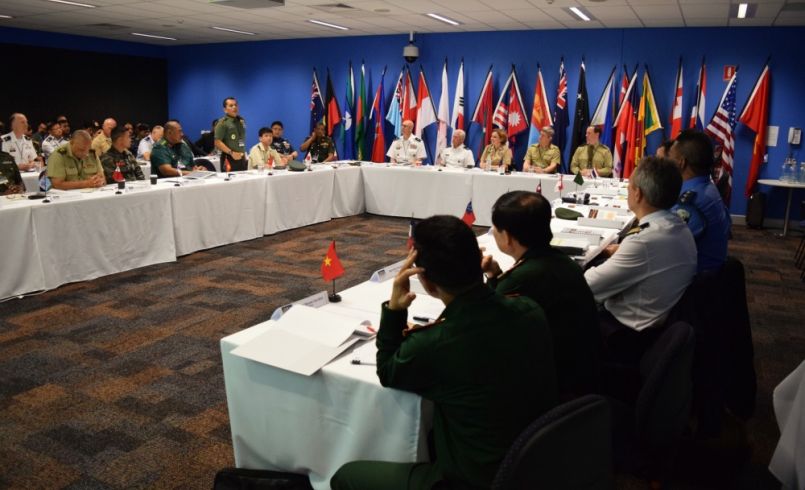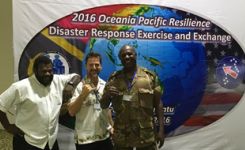- Daniel K. Inouye Asia-Pacific Center for Securi...
- Communication as a Lifeline
Communication as a Lifeline
pacific endeavor.jpg

You cannot coordinate if you cannot communicate—former Louisiana Gov. Kathleen Blanco stated that this is one of the lessons the state learned from Hurricane Katrina.[1] Communications infrastructure provides a key lifeline to humanitarian assistance and disaster relief (HADR) operations as mobile technology becomes increasingly critical in crisis response.
DKI APCSS Associate Professor Dr. Imes Chiu spoke at two panels during the Exercise Pacific Endeavor 2016 attended by nearly 250 military members and communication experts to establish the interoperability of communication assets when responding to multinational crisis. Dr. Chiu co-led the first panel presentation given to the Multinational Communication Interoperability Program (MCIP) Corporate Board held on August 29, 2016 focused on setting the conditions for the succeeding days on information sharing and interoperability of communication capabilities.
Dr. Chiu then presented in the second panel event held on August 21, 2016 with MCIP senior flag officers focusing on information technology trends that would affect HADR operations. The U.S. Pacific Command (USPACOM) co-hosted the exercise with the Australian Defence Force (ADF) and one of the primary focuses of the exercise involves hands-on practice during field training exercises using two simulated forward operating bases aimed at a new capability— the internet protocol over radio frequency (RF). Regardless of the type of radio a country is using, responders on the ground would be able to access a backside network in order to link to the internet to transmit damage assessments, needs assessment and other much needed information from much farther distances and under various terrain conditions.
Dr. Chiu spoke about some of the wider implications of these new toolsets to include trends that are already underway in the HADR space such as the democratization of information and the resulting convergence of practices among various communities of interests to include standard operating procedures in information sharing practices during disaster response operations. Defense Information Systems Agency (DISA) Joint Spectrum Center whose team aims to improve HADR response in the Indo-Asia Pacific region reinforced this convergence of practices through information-sharing modules and training briefs.
With the frequency of natural disasters in the Indo-Asia Pacific region, it is critical that assisting states communicate with each other and their respective communication equipment work well together. The validation and documentation of high frequency voice and data transfer using ordinary field radios through a realistic training environment could serve as a lifeline to many responders. The management of electromagnetic spectrum deemed as an indispensable part of relief operations during crisis became a critical component of this year’s exercise. Communication managers from cyber, radio and others gain practical insights into spectrum management as they moved towards the establishment of a common signal for the region.
Dr. Chiu also served in the White Cell team at the Gallipoli Barracks where the Multinational Coordination Center was set up. Dr. Chiu joined a diverse team of communication experts to observe how the forward operating bases at Damascus Barracks and Victoria Barracks tested the interoperability of radio systems with the coordination center at Gallipoli Barracks. Lessons learned from past disasters such as Super Typhoon Haiyan and the earthquake in Nepal attested to the importance of radio testing and communication processes in order to improve logistics efficiency and effectiveness during the crisis rapid response phase of civil-military operations.
[1] https://www.facingsouth.org/2008/03/blanco-speaks-on-katrinas-lessons-at-unc.html

